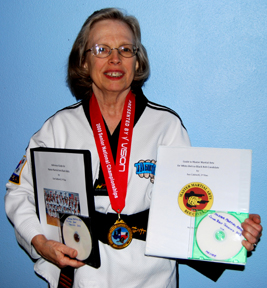Sue Ricket Caldwell

Sue was born in Cleveland, Ohio. When she was 10, Sue (with parents, older brother, and paternal
grandmother) moved to an eastern suburb, still on Lake Erie. Throughout her time in the Cleveland
area, Sue was a sickly, asthmatic child.
When Sue was 15, the family moved to Covina, east of Los Angeles. Sue's health improved; her high
school friends were amused when she tried out for the drill team for her senior year, and astounded
when she made the team. After high school,
Sue entered the University of Southern California, majoring in premed. Her major changed
three times, but she still graduated in three years, with a final double major of mathematics
and astronomy. While at USC, Sue took all the computer programming classes they had (both of
them) and decided, "This is what I want to do for the rest of my life!" And so far, it still is.
Her first job was with Logicon, as a civilian employee at a Navy base in San Diego, creating
training software for radar operators. After two years, she moved to the Los Angeles office,
where she helped develop navigation software for drone aircraft. In her spare time, she went out
for the company softball team; it was determined that the position for which she was best suited was
scorekeeper, and she developed a program to track offensive and defensive statistics for the men's
and women's teams.
In 1972, Sue moved to Austin, and began work at Applied Research Labs at The University of Texas.
At ARL, she worked on passive sonar research, often processing data from the Lab's facility at
Lake Austin. Sue joked that her job was to keep Austin safe from Russian submarine attack.
During that time, she was also the founder and first president of the Austin chapter of the
National Organization for Women, and a founding mother of the Austin Rape Crisis Center
(now merged with SafePlace).
In 1976, Sue found a new and exciting job at Tracor, working on airplane navigation systems using
Omega, a land-based worldwide navigation signals that, in the days before GPS, enabled planes to fly
across the ocean without running into anyone. She had the privilege of flying around the world to
test the system, visiting 5 cities on 3 continents in just 17 days. While there was much time in
the air, she had at least a full day off to tour each city.
In 1990, Tracor sold its navigation department to Trimble Navigation, a California GPS company eager
to start an Austin division. The Austin first helped certify, and thereafter maintained, the
California-developed Navigator series of small-aircraft systems. Then the Austin group completed
and certified new systems (begun at Tracor) to meet the requirements of major airlines; customers
included American Airlines and Continental Airlines. Sue's area of expertise became the aircraft
navigation database, which specifies the exact location of airports (including each runway) and
the FAA-approved paths for getting from one place to another.
But all good things must end, and in 2001, Trimble closed its Austin office, selling the Navigator
small-aircraft systems to a new company, FreeFlight Systems in Waco. Since then, Sue has worked
part-time supporting FreeFlight. The "part" has decreased in recent years.
However, this has provided Sue the opportunity to return to taekwondo. Sue had taken taekwondo in
the early 1990s, when the boys were also students, but stopped after they stopped and the press of
being Mom's Taxi Service left no time for fun. In 2002, she returned to Master Martial Arts, and
has since earned 1st, 2nd, 3rd, and 4th degree black belts. She now serves
as an instructor and official videographer at the school. She has written training manuals and created
the accompanying DVDs for students at the school. In 2009, Sue earned the gold medal in forms for women
50 and over at the Senior National Championships, held in Austin.
Back to main page

